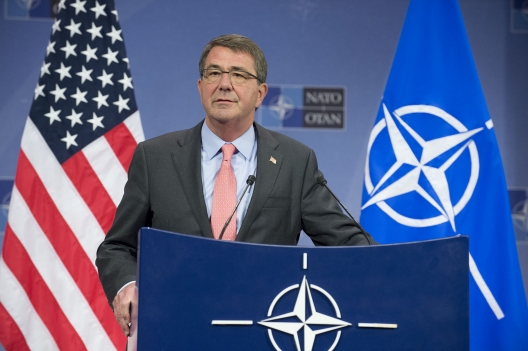 [W]e continue to have the magnetic power to attract everyone around the world. As I travel around the world, I see that they all want more—more association with us, more contribution from us. And that’s a great tribute to the United States and its values, but also to the performance of this department….
[W]e continue to have the magnetic power to attract everyone around the world. As I travel around the world, I see that they all want more—more association with us, more contribution from us. And that’s a great tribute to the United States and its values, but also to the performance of this department….
Certainly, Putin’s [behavior] is an unwelcome strategic development. That’s why we are making what I’ve been calling a new playbook for NATO, to once again strengthen deterrence through the strengthening of allies, the hardening of those countries to the kind of malign behavior that you label the use of “little green men….”
I’m frequently asked whether I know what Putin is thinking. In fact, we all do, because he says what he thinks; he couldn’t be clearer. He regrets the demise of the Soviet Union. He wants respect for Russia’s greatness. He wants a voice in the world. And he wants a nonthreatening neighborhood.
Now, some aspects of that, or the manner in which he approaches it, could be compatible with Western interests. But in other respects, we’re going to have to be strong. I have described our approach to Russia as strong and balanced. It’s strong because we’re making investments in military capability that are specifically intended to deter Russian forces. That’s not something we’ve had to do for 25 years, but we’re doing it now. We’re helping NATO to turn its attention to the deterrence of Russia after a preoccupation with Afghanistan for a decade and a half. And we’re helping societies that are not part of NATO, like Ukraine, harden themselves to Russian influence.
At the same time, we’re trying to work with Putin’s Russia on issues where his geostrategic interests, as he perceives them, are compatible with ours. Terrorism is one of those issues, Iran may be another, and North Korea, yet another. And we’re also continuing to hold the door open in case Putin or his successors decide to go in the direction where I believe Russia’s long-term future lies, a future in which there are economic and political opportunities for the people there….
[W]ithin the governments there [Europe], there is a very strong concern both with what’s going on to the east with Putin and with what is going on in the south, in the Middle East. Europe is beginning to recognize that it’s living in an era of serious security challenges, and it needs to begin to prepare for them. Obviously, we want them doing more. We’ve called on them to spend more, devote more resources. Some of them are quite active, but in general, [their] defense budgets are not matching either the real dangers they face or even an awakening sense of those dangers.
Excerpts from interview of Secretary of Defense Ash Carter by Foreign Affairs managing editor Jonathan Tepperman.
Image: Secretary of Defense Ash Carter, June 25, 2015 (photo: NATO)
